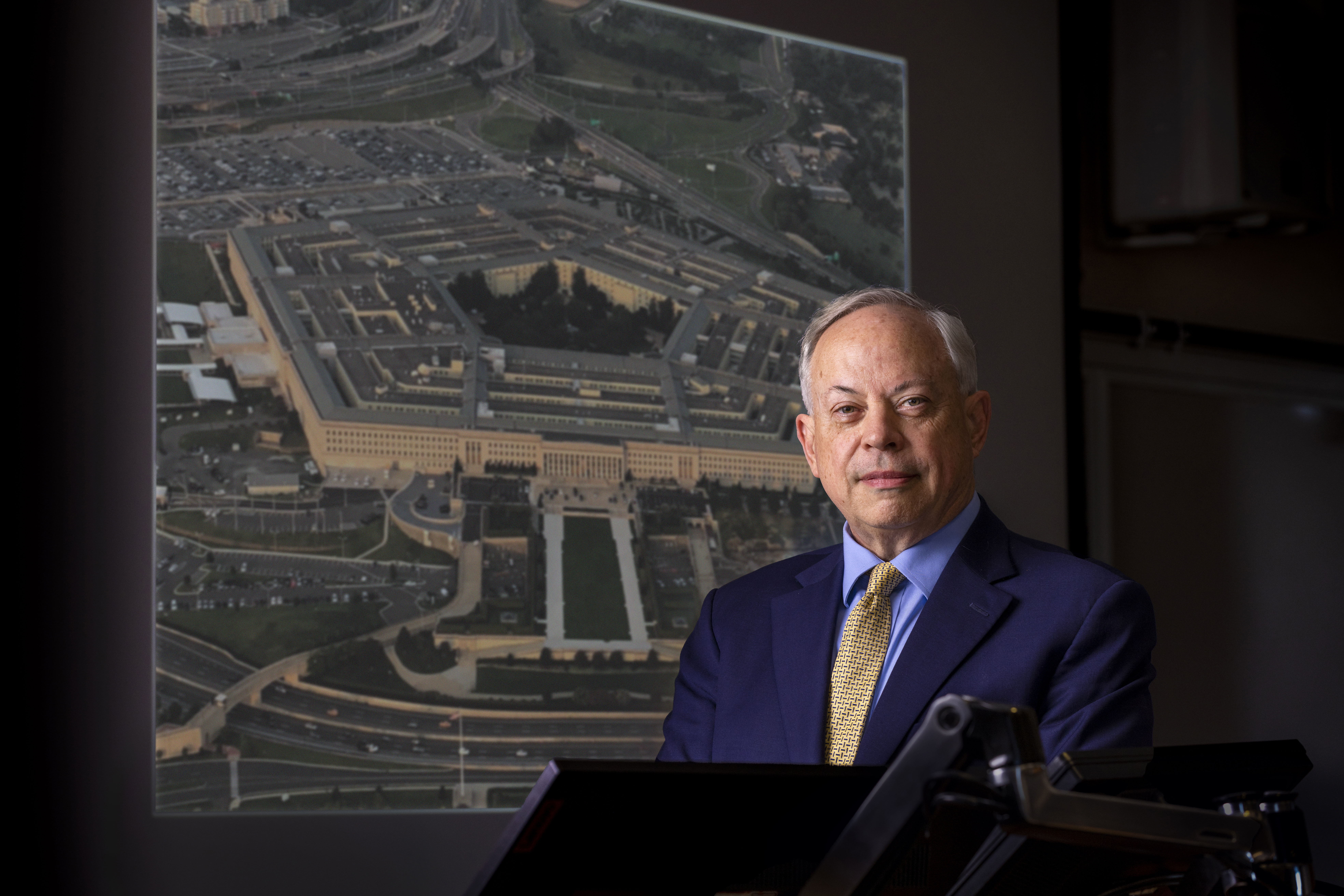
In celebration of 15 years of legal education and highlighting its globally recognized expertise in national security, the Nebraska Space, Cyber and Telecommunications Law Program is changing its name to the Nebraska Space, Cyber and National Security Law Program.
First launched in 2008, a defining feature of the program has been its longstanding relationship with the U.S. Air Force and Department of Defense. This is showcased by the more than 50 U.S. Judge Advocate General’s Corps officers who have completed the program — including JAG officers in the Air Force, Army, Navy and Marine Corps. Graduates also include civilians working in numerous U.S. government agencies and departments, including the CIA, National Security Agency and Coast Guard.
Jack Beard, director of the program, who previously served as the associate deputy general counsel (international affairs) in the Department of Defense and is a lieutenant colonel in the U.S. Army JAG Corps (retired), brings his years of experience to the program’s leadership. The creation of the U.S. Space Force and the continuing focus of the U.S. Space Command and U.S. Cyber Command has made attorneys and policymakers with specializations in the space and cyber fields pivotal to U.S. national security.
The program is available to Nebraska Law’s traditional juris doctor students, who may concentrate their studies in the area, and via online and on campus Master of Law options. Courses focus on space law; cyber law; the law of armed conflict; intelligence law; and other laws, regulations and policies related to security issues and relevant fields of study. Students focused in this area also benefit from the program’s relationship with the Department of Defense and the commercial sector through internships, conferences and research opportunities.
Students in the program are involved in research and cutting-edge scholarship in space law, particularly through Nebraska’s leadership of a major international project, the “Woomera Manual on the International Law of Military Space Activities and Operations,” set to be released this year by Oxford University Publishing. The University of Nebraska College of Law is one of four founding universities of this project, which is led by Beard as editor in chief.
The program has a rich history steeped in the intersections of security, space and technology. In August 2008, the Space and Telecommunications Law degree program was announced. Several Nebraska Law alumni — including Fred Campbell, former Wireless Bureau chief of the Federal Communications Commission, and June Edwards, former associate general counsel for NASA — attended the ceremony in support of the new program. The program amended its name for the first time in 2010, adding the phrase “cyber” to recognize Nebraska’s world-class curriculum in the area, formally renaming itself the “Space, Cyber and Telecommunications Law” program.
Matthew Schaefer, founding director and professor, led the efforts to secure a $1.71 million NASA grant to establish the program. Schaefer and Elsbeth Magilton, executive director, also co-administered a $250,000 NASA grant in 2018 to strengthen and diversify the nationwide space law network.
“The best thing about our program is the people — from the students, to our faculty, to the many people in government and industry who are involved in our conferences and research projects,” Schaefer said.
The program remains successful because of the distinguished faculty that lead the way. These internationally renowned scholars consult with international governments, private sector businesses and military actors, in addition to being consulted by national and international media on space, national security and cyber law issues.
Beard, Schaefer and Frans von der Dunk, Perlman Alumni and Othmer Professor of Space Law, provide instruction in the program’s core courses. In addition, the full list of courses in the program’s curriculum spans a broader group of faculty at the College of Law, including Magilton, Kyle Langvardt, Justin Firestone, Christal Sheppard and Elana Zeide and distinguished lecturers Dennis Burnett, Ruth Pritchard-Kelley, Lt. Col. Seth Dilworth and Christian Ohanian.
“Nowhere else in the world does the possibility exist at this level to study those domains of law that are of critical importance to humankind’s future,” von der Dunk said.
Outside of the curriculum, the program presents conferences across the United States, building an international reputation for its largest annual event, the Washington, D.C., Space Law Conference. In addition to leading many of these efforts, Magilton led the expansion of industry-focused events, including multiple events hosted in coordination with U.S. Strategic Command and other components of the Department of Defense.
“What makes the Space, Cyber and National Security Law Program so special is our community of forward-thinking students and professionals excited about the future,” Magilton said. “Spending time with our students and our government and industry partners — from career counseling to conferences to teaching — is the most rewarding part of my career.”
Today the program enjoys additional leadership from Lauren Bydalek, alumna and associate director, who brings a fresh perspective, focusing on student development.
“New and emerging technologies challenge lawyers in every field,” Beard said. “The Nebraska Space, Cyber and National Security Law program offers students a unique opportunity to study legal issues in critical areas of technology in a truly engaging and innovative learning environment. Space and cyber issues also present enormously important issues for U.S. national security. We are proud Nebraska can help address these challenges by exploring the intersection of law, technology and international affairs.”








